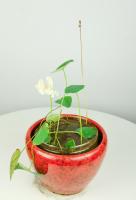What is Kelp?
Kelp is a type of brown seaweed that grows in shallow, nutrient-rich waters. It is usually found in colder oceanic and coastal regions around the world, but can also be grown in aquatic farms. Kelp is an important source of food and habitat for various marine creatures, including sea urchins, fish, and sea otters. Its nutritional value and versatility have also made it a popular ingredient in human cuisine and health products.
Is Kelp a Fresh Water Plant?
Despite its resemblance to some freshwater plants, kelp is not a freshwater plant. Freshwater plants are adapted to thrive in standing or slow-moving fresh water, while kelp requires the constant movement and nutrients found in salty, oceanic water. Kelp is a type of marine algae, and as such, it requires saltwater to survive.
Kelp's Adaptations to Saltwater
One of the key adaptations of kelp to saltwater is the presence of specialized air bladders, or pneumatocysts, that keep the plant afloat and help it reach the water's surface where it can absorb sunlight for photosynthesis. Kelp also has a thick outer layer to protect itself from the corrosive effects of saltwater, and it contains specialized structures called holdfasts that anchor the plant to the ocean floor.
The Importance of Kelp in Marine Ecosystems
Kelp plays a vital role in marine ecosystems by providing habitat for various marine organisms, acting as a food source for many species, and serving as a filter for contaminants in the water. Kelp forests also help to reduce the impacts of storm surges and bring nutrients to the ocean surface, contributing to the overall health and productivity of the marine environment.
Uses of Kelp in Human Industry and Health
Kelp is versatile in human industry and health, and has a wide range of uses. Kelp is used as a natural fertilizer for crops, and as a food source for livestock. It is also used in the production of biofuels, textiles, and cosmetics. Kelp is also prized for its nutritional benefits, as it is a good source of iodine, vitamins, and minerals. It has been shown to have potential health benefits, including reducing inflammation, improving digestive health, and contributing to weight loss.
Conclusion
In summary, kelp is a type of marine algae that thrives in salty, oceanic waters. Despite its resemblance to freshwater plants, kelp is not a freshwater plant and has a variety of adaptations to survive in the harsh, saltwater environment. Kelp plays a vital role in marine ecosystems, and has a variety of uses in human industry and health.

 how many times do yo...
how many times do yo... how many planted tre...
how many planted tre... how many pine trees ...
how many pine trees ... how many pecan trees...
how many pecan trees... how many plants comp...
how many plants comp... how many plants can ...
how many plants can ... how many plants and ...
how many plants and ... how many pepper plan...
how many pepper plan...





























